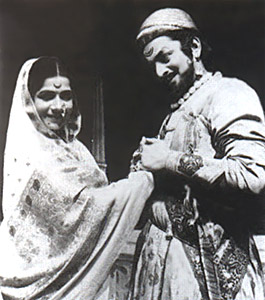 Vasant Shankar Kanetkar was an Indian playwright who wrote in the Marathi language. He was born in the small town of Rahimatpur in what is now Satara District, Maharashtra in 1922. Vasant Kanetkar was the son of the famous poet S. K. Kanetkar. He spent most of his early life in Pune, and later, Sangli, where his father was a professor at Willingdon College. Vasant Kanetkar taught English at a college in Nashik. He published three novels before his first play, Vedyacheghar unhat i.e. `Madman`s House out in the Heat` in 1957. Acclaimed as the first psychodrama in Marathi Theatre, it delved into the protagonist`s disturbed mind, but also introduced the theme of filial relationships, which preoccupied Kanetkar in his future plays. Soon after its critical success, however, he moved to mainstream writing, wishing to address a larger audience. Many of his plays went on to become big commercial successes, and he has been credited with rejuvenating the Marathi theatre scene when it was in decline, as the age of the `Sangeet Natak` or stage musical came to an end. He was a contemporary of other notable Marathi playwrights of the same generation such as V.V. Shirwadkar, Vijay Tendulkar, P.L. Deshpande and Jayawant Dalvi.
Vasant Shankar Kanetkar was an Indian playwright who wrote in the Marathi language. He was born in the small town of Rahimatpur in what is now Satara District, Maharashtra in 1922. Vasant Kanetkar was the son of the famous poet S. K. Kanetkar. He spent most of his early life in Pune, and later, Sangli, where his father was a professor at Willingdon College. Vasant Kanetkar taught English at a college in Nashik. He published three novels before his first play, Vedyacheghar unhat i.e. `Madman`s House out in the Heat` in 1957. Acclaimed as the first psychodrama in Marathi Theatre, it delved into the protagonist`s disturbed mind, but also introduced the theme of filial relationships, which preoccupied Kanetkar in his future plays. Soon after its critical success, however, he moved to mainstream writing, wishing to address a larger audience. Many of his plays went on to become big commercial successes, and he has been credited with rejuvenating the Marathi theatre scene when it was in decline, as the age of the `Sangeet Natak` or stage musical came to an end. He was a contemporary of other notable Marathi playwrights of the same generation such as V.V. Shirwadkar, Vijay Tendulkar, P.L. Deshpande and Jayawant Dalvi.
His very first drama namely Raigadala jenvha jagyete i.e. `When Raigad Awakens` in 1962, was a hit. A conscious departure from the conventional Marathi histories, it emphasized Shivaji and Sambhaji as father and son rather than king and heir. In the ensuing four decades Kanetkar wrote over forty plays, in which he tried his hand at a variety of themes and presentational modes. Prema tujha rang kasa? i.e. `Love, What`s Your Colour?` in 1961 was a romantic comedy. Matsyagandha in 1964 reinterpreted a Mahabharata legend, Lekure udandjali i.e. `Too Many Brats` in 1966 attempted a Western-style musical without dance, Himalayachi sawali i.e. `Shade of the Himalayas` in 1972 was a bio-drama based on Maharshi Karve`s life. Beiman i.e. `Disloyal` in 1973 centred round the conflict between two friends, as in Anouilh`s Becket. Chumantar i.e. `Abracadabra` in 1982 was a straightforward farce. Many had phenomenal runs. For instance, Ashruncbijhaliphule i.e. `Tears Have Become Flowers` in 1966 was a melodrama that extends the father and son conflict to the guru-disciple relationship, continues to draw packed houses.
Kanetkar`s popularity is attributed to his having a finger on the pulse of the middle class, which constitutes the mainstream audience. He shared its sensibility, which looks back with nostalgia to and pride in its creativity, its reformism, and its selfless service to society, all set within an overall romantic position. Although his plays were commercially successful, he was often accused by critics of pandering to middle-class moralities, and of symbolizing the `hallucinations of the Marathi middle-class`.
Vasant Shankar Kanetkar also bagged a Filmfare Award for Best Story in 1966 for the film Aansoo Ban Gaye Phool, which was an adaptation of his immensely successful Marathi play Ashroonchi Zaali Phule. He was awarded the Padma Shri, the fourth highest Indian civilian award, for his services to Marathi literature. He was elected president of the Marathi Sahitya Sammelan in 1988 as well. This legendary figure died in 2001.




















